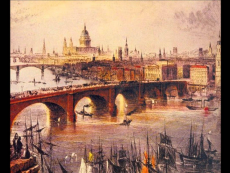
Email: reecejordan98@hotmail.co.uk
Total Article : 168
About Me:18-year-old sixth form student, studying English Literature, History and Government and Politics. My articles will broadly cover topics from the current affairs of politics to reviews of books and albums, as well as adding my own creative pieces, whether it be short fiction or general opinion.

Sick people do.’ (Luke 5:31-32) Nature complementing with nature is beautiful, Wordsworth suggests, but it is somewhat tautological; a corrupted city showing its openness to nature is far better.
The assertion of London’s momentary connection with nature, as well as the poem’s focus on temporality, creates a subtle critique of London itself and what it represents, rather than its celebration. As mentioned above, London at this time was the hub of industrialisation and was at the heart of the industrial revolution. ‘Composed Upon Westminster Bridge’ is written from a standpoint where London is seen as distant from this; it is somewhat passive. We are told it is in the morning, presumably before the city has come to life (‘Dear God! the very houses seem asleep!’), and that the ‘Ships, towers, domes, theatres, and temples lie’ (emphasis mine). This assertion of a city – which is renowned for being bustling and active – being in a passive state, and this being what induces ‘a calm so deep!’ suggests that the narrator finds pleasure in the absence of what the city normally consists of (‘silent, bare’). This is perhaps best illustrated in the final line of the octet, which reads ‘all bright and glittering in the smokeless air’. That London’s beauty (‘all bright and glittering’) is within the backdrop of the ‘smokeless air’ suggests, as mentioned before, that its attractiveness is born out of London’s inactivity. ‘Smokeless’ suggests that work in the factories has not yet begun; nature has not been tarnished by man-made pollution. By having this be the city at its most beautiful, Wordsworth creates a subtle critique of London. Its activity, he suggests, hinders it from fulfilling its full potential for beauty.
The poem can also be interpreted as harbouring a sombre tone at the moment’s transience, or perhaps at its duplicity. As mentioned above, the narrator describes the city as wearing the morning ‘like a garment’. This could further suggest that more than endowing London with a kind of beauty, the morning sun also creates a kind of façade as if it was covering up the city’s true nature. This is furthered in the concluding line of the poem ‘And all that mighty heart is lying still!’ Whilst this line on the surface reinforces the notion of London – the ‘mighty heart’ of industry and power – being passive, dead almost, there does exist some ambiguity in ‘lying’. Wordsworth could be suggesting, again, that London, in this scene of tranquillity and beauty is merely ‘lying’, being deceitful, and that its actions revolving around industry will inevitably continue to happen after this scene has past. However, Wordsworth seeks to immortalise the transient moment of calm, almost as if to offer a glimpse of a Romantic utopia where industry has stopped and nature holds primacy. By drawing attention to this periodic and transient beauty, Wordsworth in turn draws our attention to what he deems important (nature’s beauty) and how urbanisation harms or occludes it. Thus, the poem can be seen to both revel in the moment’s beauty and calm and show its frustration at how it will inevitably be replaced by that which distances mankind from nature.
Image Credits: youtube.com

0 Comment:
Be the first one to comment on this article.